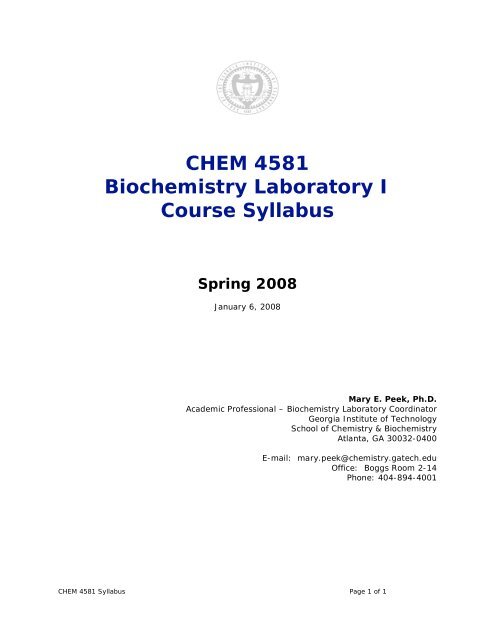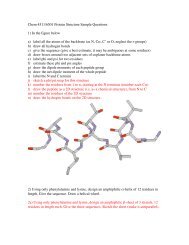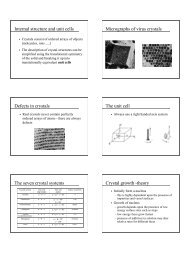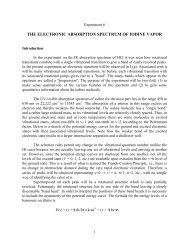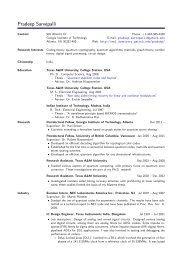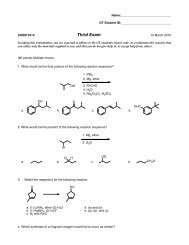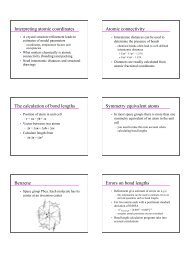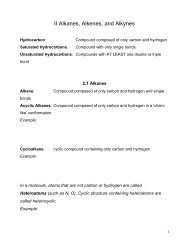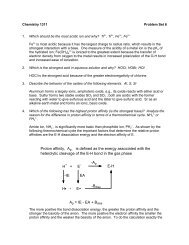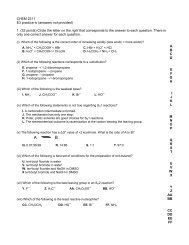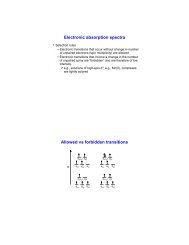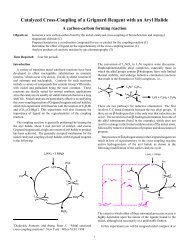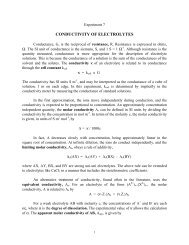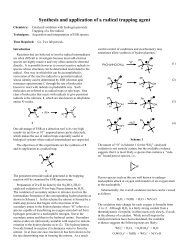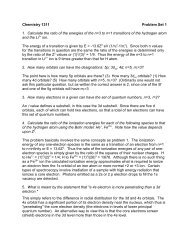CHEM 4581 Biochemistry Laboratory I Course Syllabus - Georgia ...
CHEM 4581 Biochemistry Laboratory I Course Syllabus - Georgia ...
CHEM 4581 Biochemistry Laboratory I Course Syllabus - Georgia ...
Create successful ePaper yourself
Turn your PDF publications into a flip-book with our unique Google optimized e-Paper software.
<strong>CHEM</strong> <strong>4581</strong><strong>Biochemistry</strong> <strong>Laboratory</strong> I<strong>Course</strong> <strong>Syllabus</strong>Spring 2008January 6, 2008Mary E. Peek, Ph.D.Academic Professional – <strong>Biochemistry</strong> <strong>Laboratory</strong> Coordinator<strong>Georgia</strong> Institute of TechnologySchool of Chemistry & <strong>Biochemistry</strong>Atlanta, GA 30032-0400E-mail: mary.peek@chemistry.gatech.eduOffice: Boggs Room 2-14Phone: 404-894-4001<strong>CHEM</strong> <strong>4581</strong> <strong>Syllabus</strong> Page 1 of 1
COURSE OBJECTIVEThe primary objective of this course is for students to (1) learn fundamental approaches forexperimentally investigating biochemical problems, (2) learn the theoretical foundations forthe methods used, and (3) understand the applicability of the biochemical methods torealistic situations. Topics covered in this course include methods for the isolation,purification, and characterization of proteins, nucleic acids and lipids; characterization ofenzyme kinetics; and manipulation of macromolecular structures from databases usingcontemporary visualization software.CLASS MEETINGSLectures: Mondays, 4:05 - 4:55 pm Boggs 2-28<strong>Laboratory</strong> Sections: TWRF, 1:05pm - 6:55 pm Boggs 2-10PREREQUISITES<strong>CHEM</strong> 3511 (Survey of <strong>Biochemistry</strong>) or 4511 (<strong>Biochemistry</strong> I)<strong>CHEM</strong> 3371 (Organic Chemistry <strong>Laboratory</strong>) or 3380 (Synthesis <strong>Laboratory</strong> II)TEXTNo official text is required, but <strong>Biochemistry</strong> by Voet and Voet is recommended as asupplement. Additional background reading material will be provided.HONOR CODEAll students are expected to follow the <strong>Georgia</strong> Tech Honor Code.PLAGIARISMUsing the words of another as one's own is known as plagiarism. Plagiarism is inappropriatein this laboratory and in all other situations. Material copied from laboratory handouts,textbooks, other students, or other sources must be contained within quotes, with thesource cited. Students should minimize if not avoid the use of quotations in the text to theirlaboratory reports in an effort to develop mature technical writing skills. Occasionallyexperimental work in this laboratory will be done in teams or groups. However all dataanalysis and writing should be performed independently.EQUIPMENT AND SUPPLIES REPLACEMENTIn the event that glassware or other equipment and supplies are damaged or broken bystudents, the student must pay for the replacement of those items with your Buzz card. Alist of commonly damaged items will be posted in the laboratory. Please exercise cautionwhen working with electronic pipetting devices and electrophoresis equipment, among otherdelicate items in the <strong>Biochemistry</strong> <strong>Laboratory</strong>.ABSENTEEISMLack of attendance, tardiness to class, and tardy assignments will be excused only withprompt written documentation. Report to class on time! Due to limitations in supportpersonnel, opportunities to make up missed laboratory experiments will be rare, if at allpossible.<strong>CHEM</strong> <strong>4581</strong> <strong>Syllabus</strong> Page 2 of 2
GRADINGThe overall grading scheme for this course is as follows:30% - <strong>Laboratory</strong> Reports30% - <strong>Laboratory</strong> Performance10% - Problem-Based Learning Class Presentation10% - <strong>Laboratory</strong> Notebook Maintenance10% - Examinations10% - HomeworkLABORATORY REPORTSThe purpose of the laboratory report is to communicate experimental work in writing. Theeducational goal is to help students learn and practice expressing their ideas and describingtheir work in a professional manner. With this in mind, the requirements for the structureof the laboratory report are similar to those for peer-reviewed scientific literature: <strong>Laboratory</strong> reports must be submitted in hard-copy format to the instructor or TAdirectly. Do NOT leave reports in insecure places for them to be found by the TA atsome unspecified time. Acceptable laboratory reports will be no longer than 10 double-spaced pages withwriting on one side of the paper (title page not included). NOTE: Double-spacingallows graders to make comments near the relevant text. The laboratory report forthe problem-based learning session cannot exceed 15 double-spaced pages. Reports should be written in grammatically correct English, and prepared using aclear font of size 12-point, with at least 1-inch margins on all sides. Each page should be numbered at the bottom. <strong>Laboratory</strong> reports should NOT be formatted with dual column text as seen inpublished journal articles. Figures should have figure legends describing the figure in sufficient detailunderneath the figure. Tables should have headings at the top of the table. Fontsizes of text for figure legends or tables may be 8-10 point in size.DEADLINES. <strong>Laboratory</strong> reports are due one week after scheduled completion of lab workas indicated by the schedule online. The report must be given to a TA or instructor, anddated. Do not put reports in the instructor's mailbox or under his/her door to avoidmisplacement of your report. You may submit reports to the Main Office in Boggs or theMSE Building. Delinquent laboratory reports will be graded according to the followingschedule:1 day late - deduct 5 points2 days late - deduct 10 points3 days late - deduct 20 points4 or more days late - a grade of "0" will be given for that labSaturdays and Sundays count for one day each!<strong>CHEM</strong> <strong>4581</strong> <strong>Syllabus</strong> Page 3 of 3
If students need to submit lab reports on Saturday or Sunday, the student must make arrangements tomeet the TA in advance. The TA is not obligated to be present to accept laboratory reports on weekends.<strong>Laboratory</strong> Report Components Title Page – (Required) Provide the experiment title, author, partner's name (ifapplicable), date(s) experiment performed, date handed in, and the author'ssignature indicating that the laboratory report was the authentic work of the personwhose signature is listed and that the <strong>Georgia</strong> Tech Honor Code was followed. Introduction (15 points) - Present background for the experimental work described.State relevant concepts and hypotheses and the objectives of the experiment. Referto journal articles (not web sites) where you have read supportive backgroundinformation. Experimental Procedures (15 points) - Summarize the specialized reagents andtheir sources and equipment used in the experiment. Generally describe methodsused especially where deviations to the protocol were made. Include the level ofdetail commonly found in published research articles and, only when necessary, addadditional details. Results (30 points) - Describe the data generated from the experiment in words.Then, present figures (including graphs) or tables of your data for emphasis andclarity. Each figure should have a figure legend underneath the figure - a statementdescribing the figure itself. Each table should have a table heading above the table.All figures should be clearly labeled. Results sections with insufficient text describingthe results and/or key illustrations of data will merit very few possible points. Discussion (30 points) - State the overall conclusions from your experiment here.In cases where the work was hypothesis-based, the discussion should address thehypothesis directly. Discuss the significance, implications, comparisons of results toother work, etc. State and critically evaluate any assumptions that were made.Estimate the accuracy of your results. Discuss any observations that you foundunusual or unexpected, and why they may have occurred. Note and discussinconsistencies in your data that make drawing firm conclusions difficult. Discussimprovements that could be made in the laboratory hardware and apparatus thatcould improve your results. References (10 points) - List the references made throughout the text of theresearch article in the order in which you refer to them in the text. References arerequired, not optional! Reputable resources should be used as references. Websites are not reputable resources for a professional laboratory report. Avoidreferencing your <strong>Biochemistry</strong> textbook since it contains general information.<strong>CHEM</strong> <strong>4581</strong> <strong>Syllabus</strong> Page 4 of 4
<strong>Laboratory</strong> Performance/Conduct Students are expected to have read the laboratory protocol for the day prior to reportingto class. Note: Be sure to review all links associated with a laboratory protocol. Students are expected to follow written procedures for conducting assignedexperiments. Due to limitations in equipment, students will be asked to work with theTA/instructor in cycling through the laboratory work. Students are expected to work independently (or when necessary, with laboratorypartners). Students are responsible for the upkeep of their assigned workstations. Be sure torestock all pipette tip boxes at the end of each class period. Be sure to clean all glassware before the end of the class period. Keep the balance and instrumentation areas clean and free from clutter. Be sure to report any malfunctions in equipment to the TA or instructor. All materials stored in the refrigerator, freezers, or at room temperature must be cappedand clearly labeled with your name and its contents. Follow all safety regulations and encourage others around you to work safely as well. Do not eat, drink, or chew gum in the laboratory. DO not bring food, including bottledwater into the laboratory. Do not discard food trash in the laboratory. Do not bring food into the laboratory.<strong>Laboratory</strong> HazardsSome of the chemicals used in this laboratory are harmful if inhaled or ingested. Always wear safety glasses in the <strong>Biochemistry</strong> <strong>Laboratory</strong>! Reading eye glasses nolonger suffice as suitable safety protection for the eyes. Wear suitable clothing in the <strong>Biochemistry</strong> <strong>Laboratory</strong>. Sandals and shorts (unlesscovered by a lab coat) are not permitted in the lab. Wear latex gloves when working with dangerous biochemicals. Do not allow laboratory chemicals to enter your mouth or small cuts or scratches onyour hands. Latex gloves are available for daily use to avoid this problem and toprohibit contamination of laboratory experiments. Do not inhale powders or vapors. This is especially important when working with sodiumdodecyl sulfate (SDS) powder, concentrated acids/bases, and mixtures of acrylamideand bisacrylamide solutions. It is good practice to wash your hands carefully before leaving the laboratory.<strong>CHEM</strong> <strong>4581</strong> <strong>Syllabus</strong> Page 5 of 5
Read and follow instructions.Problem-Based Learning SessionProblem-based learning (PBL) is a contemporary approach for educating students with “realworld problems” as a means of stimulating thinking and consolidating knowledge from avariety of disciplines in an effort to solve a problem or propose a strategy to solve aproblem.<strong>CHEM</strong> <strong>4581</strong> students will participate in a very short-term PBL experience involvingdetermination of genetic modifications in a food of the student’s choice. Geneticallymodified organisms (GMO) in foods have some characteristic features in DNA that are notpresent in natural foods. Students will have two days to complete their experimentation.Day 1Day 2Day 3Extraction of DNA from FoodPCR Amplification of DNAElectrophoretic Analysis of PCR ProductsOral Presentation of Student FindingsThe oral presentation should be no longer than 30 minutes. Students should preparea Power Point presentation and submit an electronic version of their talk to theinstructor prior to the class period on the presentation day. Presentation of resultswill be evaluated by the instructor and TA.<strong>Laboratory</strong> Notebook Maintenance All experimental data, except instrument output, should be recorded in indelible ink in abound laboratory notebook with pre-printed sequential page numbers. Students should sign the notebook on the last page of that day’s experiment. Do not leave blank pages in a laboratory notebook. A lab notebook should include protocols, identification of samples, observations, anddata. Record data and observations as you obtain or make them. Do not write on scraps ofpaper with the intention of transferring information to the lab notebook later. Do not worry if your notebook is a little messy. The recording and organization of a permanent record of laboratory observations is asimportant a technique to master as any of the experimental methods you learn. Theresearch notebook is a day-by-day record of the progress of experimental work. Itshould reflect the integrity and honesty of the experimenter as well as the clarity of hisor her thought.<strong>CHEM</strong> <strong>4581</strong> <strong>Syllabus</strong> Page 6 of 6
ExaminationsDuring the lecture period, students will be given two comprehensive examinations: Feb 11and March 31. The examinations will be closed-book and will cover content from thelectures and lab sessions, as well as background reading. In the event that calculations arerequired, standard calculators may be used, but not shared during exams. Talking isprohibited during the examination period.No final exam will be given for this course.HomeworkHomework assignments will be made periodically throughout the term and will usually begiven to students during the lecture period (or online). Therefore, attendance at eachlecture is strongly encouraged, but not required. Deadlines for each assignment will bemade at the time the assignment is given. Be prepared to submit your homework to theinstructor in hard copy form by the deadline. Late homework will not be accepted!<strong>CHEM</strong> <strong>4581</strong> <strong>Syllabus</strong> Page 7 of 7


